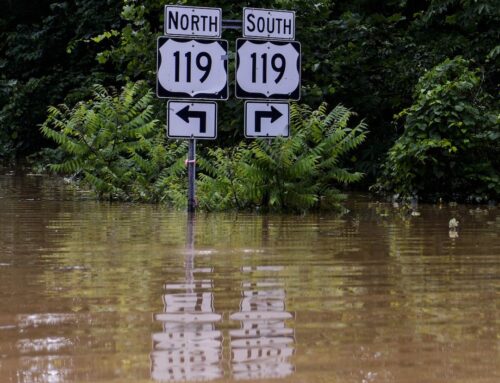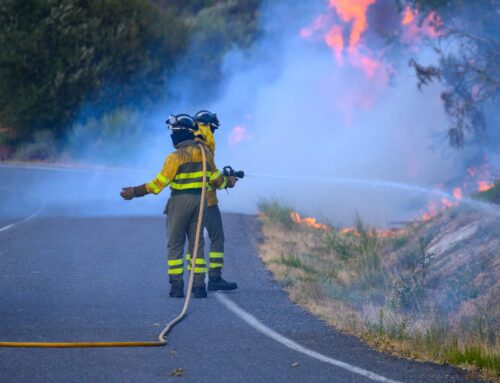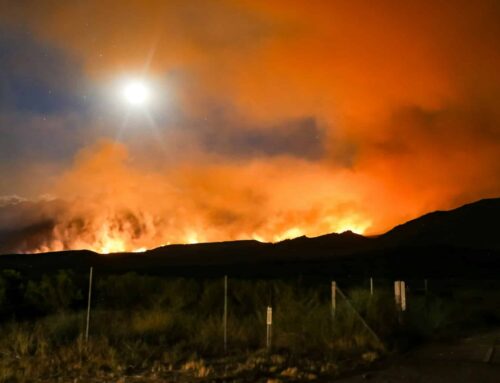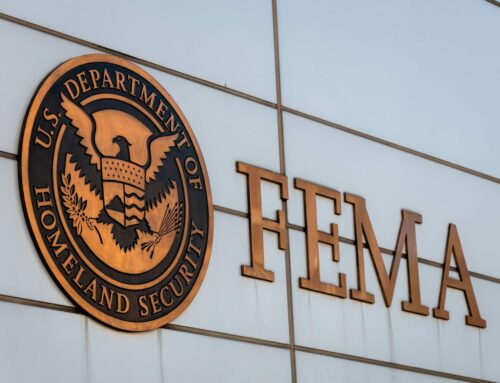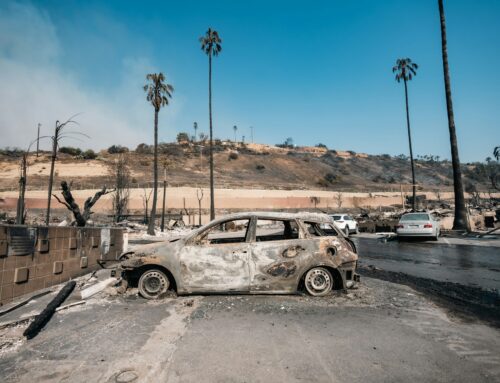The Trump administration is proposing fundamental changes to federal disaster response, shifting from FEMA’s current model toward block grants that give states more control. The goal: reduce federal bureaucracy and empower local decision-making. But new analysis raises important questions about whether states have the financial capacity to handle major disasters alone.
An Urban Institute study found that only 5 out of 31 disaster-affected states had sufficient reserves to cover what they would lose under proposed changes. Meanwhile, implementation challenges are emerging: delayed disaster declarations, staffing reductions at FEMA, and coordination issues between federal and state agencies.
TCS President Steve Ellis and Director of Research & Policy Josh Sewell examine both sides of this debate. While federal disaster response clearly needs reform to improve efficiency and accountability, they explore whether current changes are achieving those goals or creating new problems that could cost taxpayers more in the long run.
Transcript
Announcer:
Welcome to Budget Watchdog All Federal, the podcast dedicated to making sense of the budget spending and tax issues facing the nation. Cut through the partisan rhetoric and talking points for the facts about what’s being talked about, bandied about and pushed to Washington, brought to you by taxpayers for common sense. And now the host of Budget Watchdog AF TCS President Steve Ellis.
Steve Ellis:
Welcome to All American Taxpayers Seeking Common Sense. You’ve made it to the right place for 30 years. TCS that’s taxpayers for common sense, has served as an independent nonpartisan budget watchdog group based in Washington dc We believe in fiscal policy for America that is based on facts. We believe in transparency and accountability because no matter where you are on the political spectrum, no one wants to see their tax dollars wasted. Today we are revisiting one of the most important questions we’ve ever asked on this program. Who pays when disaster strikes? Well, taxpayers still pay. That hasn’t changed, but what they’re getting for their money is changing dramatically. The Trump administration is proposing to fundamentally restructure the federal disaster response, moving away from FEMA’s hands-on disaster management toward a block grant model. The result, taxpayers will still foot the bill, but they’ll get significantly less service and support when disaster strikes their communities. A new analysis from the Urban Institute reveals a harsh reality. No state, not even the wealthiest has the fiscal capacity to handle major disaster recovery alone. That’s exactly why FEMA is created in the first place. Joining me now to consider this and other questions relevant to taxpayers is TCS Director of Research and Policy, Josh Sewell. Josh, thanks for being here.
Josh Sewell:
Yeah, happy to be here to talk about this really important issue.
Steve Ellis:
Josh. Let’s start with the fundamental reality here. When a true disaster hits, whether it’s Hurricane Helene, the next California wildfire, a massive tornado outbreak, or in the case of when we first taped, who pays, when Disaster Strikes podcast, the Francis Scott Key Bridge collapse in Baltimore, do any states actually have the money to handle recovery by themselves? Let me answer my own question. The answer is no, and it’s always been no, that’s why FEMA exists, right? But now the Trump administration wants to change how that federal money flows. What exactly are they proposing?
Josh Sewell:
Well, they’re proposing a lot of things, but the biggest thing is that they originally proposed eliminating fema. So the overall crux of the Trump administration’s goals is to shift the responsibility for disaster response to the states. So you would no longer have a federal agency that deploys personnel around the country to wherever disaster strikes or an agency. That’s the primary point for doling out funds for disaster preparation, for that disaster response and that disaster recovery because FEMA would basically become a pass through entity just sending cash to states.
Steve Ellis:
Well, Josh, this is before your time, and it was before my time at taxpayers for common sense, but the first disaster that I really handled, well, actually after I left my ship in the Coast Guard and I came to Coast Guard headquarters, was the great Midwest flood of 1993 that affected all the states in the upper Midwest along the Mississippi River. So you had multiple states that were affected and how could they coordinate? I mean, Missouri and Illinois, they’re across the same Mississippi River that was flooding both of them. And to have a response that’s disjointed and disconnected makes no sense to me.
Josh Sewell:
Yeah, I think floods are the most obvious place and hurricanes, which often lead to floods. I think flooding is really the most obvious place where you need to have somebody, some entity coordinating response amongst not just states, but dozens to hundreds of counties, local governments and other folks, because water goes wherever it needs to go, and water is the border for many of our states, especially those of us back from the Midwest.
Steve Ellis:
So off of my little tangent there, let’s get back to this financing question. So let me get this straight. For taxpayers, Josh, they’re still going to pay federal taxes that in part code a disaster response, but instead of getting a coordinated federal response with FEMA teams on the ground, they’ll get what exactly. And Josh, the Washington Post found that DHS Secretary Christie Nome now requires personal sign-off on any contract over a hundred thousand dollars, which delayed search and rescue operations in Texas when every hour counted. Is this the new normal?
Josh Sewell:
I certainly hope it’s not a new normal because it’s a little too inefficient and causes a lot of problems. So talking about block granting, to be frank on this block, granting is a tool that can be useful and other times it can not be useful. It depends on how you do it, but the way this administration is moving is they’re going to have a lot of deference to non-federal agencies, states mostly, but also smaller parts of government. And again, preparing for responding to and that immediate cash recovery in a disaster because FEMA does a lot of stuff. It’s not just about rescuing people. It’s not even the primary point for rescuing people off of roofs or that immediate response. It’s more about how you prepare for those disasters and then how you help people in that immediate recovery. And then the long-term recovery as well.
I mean, think of things like rental assistance, cash to buy food, cash to buy diapers, and also those longer term recovery costs. Disasters are complicated. It’s a very diverse needs, the various diverse type of people that are affected. And so there’s a lot of responsibilities. A lot can go wrong, A lot can go right. I’m trying to be very fair. I’m trying to be very kind to the administration. I mean, some of their concerns are legitimate. I think there’s been a lot of criticism of FEMA that is inefficient, that it doesn’t respond well. And at times that’s true. It can be a little too slow, but there’s really just grains of truth that lead not very good solutions. And block granting as it’s being envisioned doesn’t seem like a solution because some of those biggest challenges are still going to be there. Rural areas are hard to respond to.
Places with high poverty are hard to respond to. The individuals themselves are sometimes hard to find because they don’t necessarily have the same kind of connections to community or the same kind of paper trail for their existence. Frankly, if you don’t have your records to prove you own a house, that’s hard to prove. You own a house, especially even if you have those records, the house has been washed away. And so before these disasters really struck this year, we, myself personally, I think organizationally and others were concerned that because of what fema, some of the changes that Trump administration was projecting that they were going to do, and then some of the things that they actually did do is that when the disaster inevitably strike, they’re not going to have the right response. And so what we’re seeing now is that’s starting to bear out. But I really want to emphasize again on the block granting issue, it’s that it seems to be a goal of washing your hands in some respects of saying we’re no longer responsible, said, look, we saved money because we block granted this to the states, but the states. So they’re going to have to figure out how to respond to these problems, and these problems are still going to exist. So whether it’s an actual solution or it’s up costing more in the end, both in lives and property, that’s pretty clear what’s going to happen there.
Steve Ellis:
Well, one thing that’s staggering to me out of this whole thing that the Secretary of Homeland Security can only has to approve anything over a hundred thousand dollars. Well, clearly if a disaster was less than a hundred thousand dollars, it wouldn’t overwhelm the states. There wouldn’t be a major disaster declaration before any of these FEMA dollars can flow. The president has already declared a major disaster declaration. And so the idea that the secretary has to check the box on all these funds makes zippo sense in that respect. And then the idea, the concept of block grants, when you’ve heard about it before, whether it’s in other areas of government, has been states are the incubators of change that they can reform, that they can figure things out. But a disaster is a different animal. It’s not like your regular everyday operations. It’s every single one is different, but they do have trend lines and themes through it. And that’s where FEMA has the institutional muscular memory to actually be able to respond to these. Whereas states, even their own emergency management agencies, they’re in the thick of it, they’re overwhelmed. These are the reserves, these are the backups coming in to help the states achieve this. Cash won’t bring you more staff at the emergency management agencies. They won’t give you more capacity. It’s actually bringing more bodies, more knowledge, more equipment. That’s what really happens.
Josh Sewell:
And I think that lends itself towards having a more centralized expertise and entity that has expertise in the planning and preparation part. But it also, it speaks to the response as well. I think one of the things about disasters, it shows great resilience and individual heroism that comes from people. It’s amazing acts of community service. But at the same time, for every camp counselor that saves 20 kids, which is a heroic event, it also speaks to that rookie coast guard swimmer who saved 138 lives or something. Like Steve, you were in the Coast Guard, you were a swimmer. I don’t expect you to save, I mean to save 138 people if there’s a flood that goes through Washington dc. But the Coast Guard, I don’t know exactly where they are, but I see the helicopters fly all the time in dc Those individuals are trained to do it. Having the people trained to do it, it’s more, frankly, it’s more efficient, it’s safer and it’s better. And so it also comes to just a question of how much preparation do you really need? It may be great to have a fire department on every block because you’d be really safe, but that’s not a good use of funds. And so it doesn’t make sense to have people who are trained, and I love block granting in certain areas, but it’s a push and pull here. And so that’s where we are.
Steve Ellis:
Budget watchdog, AF faithful. It is true. I was in the Coast Guard and I did swim at the Coast Guard Academy, but I was not a Coast Guard rescue swimmer, which is a specialized training that I think I would’ve washed out of to be frank. But that said, it is true that the people that are coming, and I’m not just talking about Coast Guard, I’m also talking about fema. There are bureaucratic issues with FEMA as Josh alluded to, and it’s something that we certainly want to see things streamlined, but there are also people who we know take advantage of disasters to rip off the federal government. They’ve been prosecuted and there are people that are going to do that. So there’s a push pull and there’s a tug here, and I really question that Lawmakers they want to hate on fema. By the same token, they need FEMA, right, Josh?
Josh Sewell:
Absolutely. And I think the issue of fraud and abuse is actually a testament to why you need fema. Because if you handed me a hundred million dollars to respond to a disaster, I have no idea. Well, actually, I technically do have some ideas how to do it. I’ve worked on this. But in the actual day-to-day operations of it, I would be very inefficient at doling out that a hundred million FEMA and its partners, if we work ahead of time to figure out some of these protocols, some of these systems, we can actually reduce some of this burden and not just deflect, but actually prevent some of this inefficiencies and actual fraud. And so you can hate on the agency and FEMA itself will admit that they are falling fall short of what they need to do. The GAO has all kinds of reports on this, and outside groups like ourselves have reports on this, but throwing that, just eliminating the agency doesn’t eliminate those problems.
And frankly, it would actually potentially make it worse because states are not necessarily prepared the same way that FEMA is because a disaster is going to happen. It’s not going to happen every year in the same place. So Texas devastated by some stuff this year haven’t been hit by a hurricane yet, I don’t think, and maybe they won’t. You can go years without being hit by a hurricane, but a hurricane is going to hit somewhere. And maybe more technically there could be a year without a hurricane. There’s going to be tornadoes. A tornado is going to hit down many of them in many places every year. But I lived in Midwest forever and the tornado went basically through our backyard the year after we moved. So I never have actually seen a tornado in person, even though I’ve lived in tornado alley forever. But FEMA has seen thousands of tornadoes. So I just think it’s this idea that disasters, we seem to have a short memory as individuals and even as voters perhaps, and as taxpayers, but we need somewhere to keep that institutional memory and the ability to respond and to know the problems that are going to be there and the opportunities. And FEMA is where it’s at. You can reform fema. You don’t need to get rid of it.
Steve Ellis:
And by reiterating the point that the state that is getting the block grant is in the midst of a disaster, they’re right at the heart of it. And even if it’s a big state like Texas, they’re still in the midst of it. And the same people that you’re asking to try to approve grants or do things along these lines are the people who are saving lives and picking people up off of roofs and helping debris removal. Okay, so Josh, the Urban Institute, as I mentioned earlier, looked at 2019 as a test case and found under the proposed changes, the block granting states would’ve lost access to nearly 1.3 billion in federal disaster funding. But here’s what’s really striking. Only five out of 31 affected states of that year had enough money set aside to cover what they would’ve lost. Josh, doesn’t this help prove this whole premise is flawed?
Josh Sewell:
Yeah, I think it proves that you need, this is a tough issue and you need a real balance. And so I do encourage our listeners if they haven’t, or if they have to go back and listen to our other podcast on disaster, and you’ll see that in some respects, I think we wrestle with this issue ourselves about exactly how much financial responsibility should be on the direct beneficiaries of any policy, and disaster is one of those as well. But when you actually look at some of the nuts and bolts of what the administration is proposing, if you increase the disaster declaration threshold to what the administration is proposing, then 71% of the disasters that were declared in the last 16 years wouldn’t have been declared a disaster. And so to me, that’s probably an overcorrection. And so of course states, many states need to do a better job of planning and financially preparing for a disaster.
But the fact that it’s a disaster, if it really is overwhelming, it’s not something that you can plan for all of it on your own. That in itself is not necessarily an efficient use of resources, setting aside some funds, doing the planning, but when the actual disaster strikes, you need that assistance from other people, not just financially, but as you mentioned, we can have a little bit more sober thoughts and better at actually doing some of the recovery that needs to happen as opposed to those who are actually trying to keep their house from physically burning down.
Steve Ellis:
You’re absolutely right, Josh, that we have talked about that we need to make sure that states have the skin in the game, that they’re investing the resources ahead of disasters so that they’re better prepared to respond to that disaster. We’ve talked about responding to disaster of mitigating so that there’s less impacts going forward, and then also planning so that they can use the funds that come post-disaster to rebuild in a way that makes them less vulnerable in the future. And that is also that sort of responding. So it is sort of where you want to have the state’s mechanism, make sure the states have skin in the game. We talked about a sliding share of disaster assistance, but clearly cutting out more than 70% of the major disaster declarations, as you said, is an overcorrection. Alright, Josh, the Washington Post reporting gets even more into this, and this one will hit closer to home for you, Josh.
They found that Missouri made three major disaster declaration requests this spring and only got approval last Friday after months of delay. St. Louis faced a deadly tornado in May that killed five people and caused 1.6 billion in damage. But FEMA didn’t deploy for three weeks leaving the local first responders to handle search and rescue sheltering and debris cleanup on their own. The mayor said, our cities aren’t equipped to deal with thousands of displaced people overnight, but here’s what really gets me fired up as a bunch of watchdog taxpayers are still paying for fema, but FEMA isn’t showing up. How is this not fraud?
Josh Sewell:
Well, maybe it is fraud. It’s certainly a dereliction of duty and I think that’s one of my big concerns. So the administration hasn’t eliminated fema. They legally can’t. FEMA is an agency that only Congress can technically eliminate, and there’s still money going to fema, like you said, and we are certainly also paying our taxes, but they have cut much of the on the ground capacity. A lot of those pre-litigation programs that you mentioned, those are what have actually been cut at FEMA or have been impounded and the funds haven’t been dispersed. But also it does get a little personal, so it’s hard to talk about.
I just think that working on disaster for so long, I can’t emphasize enough that states do need to do a better job of preparing, and this is a state level responsibility. St. Louis itself has significant capacity, but there’s an entire state of Missouri that can help with St. Louis or Kansas City or Joplin years ago when it was completely devastated by a tornado tornado. But this is about spreading out the federal need and we are paying taxes. We have the capacity, we have the ability. Much of this is just the administration needs to let FEMA do its job and figure out where it can do it better, but it needs to just be able to do its job. And whether it’s the secretary, g knowns, micromanagement, and the finances or some of the ideologically driven apparent, I think motivations of the administration in the block granting push. This is not about making FEMA work better. It’s about, I’m not sure what it’s about. I think it’s just about shrinking government perhaps, and I don’t honestly know what it’s about. And so it’s hard to prescribe some solutions when you don’t know what the actual goal, if there is a goal, if the administration feels that they have a responsibility to helping people help themselves.
Steve Ellis:
Maybe Josh, it said you need to have states require that they have a certain percentage of their annual budget be in a rainy day fund. And so that way they’re able to have that initial response. We know by a percentage of their budget that this is actually overwhelming their capacity because we know how much money they have and that way, or it’s even looking at historical levels of assistance and things along those lines. But there’s ways to go about this smart that isn’t just slashing to the bone until somebody squeals and they stop.
Josh Sewell:
Yeah, I think look, budgeting for disasters is not easy. It’s similar to paying insurance in some respects. I’ve spent, I don’t know, and you organizationally have spent a ton of money on my health insurance and I haven’t made any money off of that. I haven’t been in the hospital. I’ve been in the emergency room a couple of times, but I’ve lost money on my health insurance. Same thing on my car insurance, but when I need it, it’s going to be there. And that’s how you have to budget for disasters to a certain extent. And yeah, getting to the details, it’s tough because again, you have 50 states post the District of Columbia that have to budget for this stuff and have to plan for it. And some of those places have a greater capacity perhaps for funding this and others have different vulnerabilities. And so skin in the game is important, but don’t want to lose sight of the fact that a place like Louisiana, there’s a lot of critical infrastructure.
The ports, I mean the parts of the state that are below sea level literally carry important infrastructure, energy, infrastructure and support infrastructure. And so we do as a country, get benefits from, it’s not just local benefits from some of these, a disaster preparation and stuff like that, but at the same time, whether it’s a percentage of the budget or putting an onus on certain areas to have a bigger budget, if you always just sit here and wait for the federal cavalry to come in and save you, that’s a plan for some states too, it appears. And so there does have to be hard conversations, we call it. But in the end, we’re going to pay for it and someone’s going to pay for it, and it would be better to plan for it and financially pay for it ahead of time at the various levels of government than to pay for it in a higher bill, oftentimes in the disaster response, but also you’re paying forward in larger losses of property and more importantly lives.
Steve Ellis:
And you mentioned conversation, Josh, and that’s what we’re not having. I mean you and I are having a conversation, but administration and congress, the policymakers, the people who created FEMA, they’re not having that conversation. It’s being kind of driven by the administration saying, oh, nope, we’re just going to change the whole way this is being done. And what we’ve seen in the major disaster for the president is that they’re approving when they actually are approving. They’re approving individual assistance and public assistance essentially funds for people and infrastructure but not hazard mitigation assistance and increased mitigation assistance post-disaster was actually a highlight of the first Trump administration, but that is being decimated.
Josh Sewell:
Yeah. I don’t know if this is just shortsightedness on their part or just a doge infection in the body politic or what’s going on here, and it doesn’t make sense. Like you said, I forgot that it was the Trump administration. All the administration’s blend together for me lately apparently. But the last Trump administration, you actually had a number of good things in the disaster area and flood insurance realms, but the disaster is going to happen again. One of the benefits, if you want to call it that, a lesson learned from a disaster is you can see your vulnerability. The flood came, the tornado happened, so how can you protect yourself the next time if it happened once, it can happen again. You can figure out how to do things a little different to increase your level of protection, and that’s what mitigation is. It’s a very pennywise pound foolish, I guess is the way, but it’s more like a billion. Why is a trillion foolish? I don’t know exactly. I don’t know what the scale is, but it’s there. And so it just doesn’t make sense from someone maybe, I don’t know. Are there too many new members of Congress that they didn’t experience Hurricane Katrina, let alone, which a lot of ’em haven’t, let alone soup Storm Sandy back in, was that 2012 or Hurricane Harvey in 2017
Steve Ellis:
And Irma and Maria?
Josh Sewell:
Yeah, and this stuff just, this feels like it was yesterday to me, but I realized that was 13, 20 years ago for Katrina, but it feels maybe more people need to work on this professionally.
Steve Ellis:
Yeah, the end of next month will be the 20th anniversary of Hurricane Katrina. So Josh, the Washington Post found something that should outrage every taxpayer. The agency has lost hundreds of employees in important leaders in recent months, FEMA’s acting deputy administrator just resigned saying, I will not be complicit in dismantling of this agency. The acting appointed by the Trump administration, FEMA director was dismissed earlier this year because he thought that he stated to Congress that he didn’t think it was in taxpayer’s interest to get rid of the agency. And on July 5th, the day after the deadly Texas floods, the administration let the contracts expire for hundreds of workers managing FEMA’s disaster assistance hotline. So in the middle of a disaster, they fired the people answering the phones. FEMA can only answer a fraction of the thousands of calls they were getting. This isn’t reform, Josh, is it?
Josh Sewell:
No, absolutely not. This is sabotage in many respects. I think if you want to get rid of an agency, proposes elimination, have Congress do it, agencies serve a purpose, whether you like the purpose or not, they are there to administer what Congress has appropriated for what we have agreed to do as a country. If you want to change what agencies do, go through the process and change it. But I think this experience with FEMA and the actions so far this year is showing that there are some real consequences to not following that duty of care, as I would call it, to not doing what we have agreed. We need FEMA to exist in order to do, and I think it’s, I guess reprehensible is the word I’ll use.
Steve Ellis:
We’ve called for reforms and FEMA and in disaster response. I think that that’s an important discussion to have. It’s something that we think should be done. We’ve talked about community development, block grants for disaster recovery, how that needs to be statutory and authorized and structured. We’ve talked about other reforms for resiliency, the sliding share, the fact that states and localities should be looking at insurance and other things and public infrastructure. So there are things to do and conversations to be had, but that is not happening. And I guess even most fundamentally about having conversations is that the Washington Post found that the White House is now approving disaster declarations without even notifying fema. Virginia got federal aid approved in April. The governor issued press releases. Local news reported funding was coming, but FEMA found out by reading the headlines days later, they’re running disaster policy by Twitter or maybe true social. While people aren’t drowning and get this, the White House told FEMA that Trump doesn’t have to follow the agency’s recommendations and won’t justify his decisions when he denies aid, which I think is more important. I mean, the president could decide whether he wants to approve or disapprove, but he should actually explain his rationale. We’re going from evidence-based disaster response to pure presidential whim. What kind of fiscal management is that?
Josh Sewell:
Well, it sounds like weaponization of government. To me, this is not an appropriate way to run an agency. This is not an appropriate way to meet a necessary and important need for people. Again, I’m trying to be very cool and collected on this issue, but because the stakes are high, this isn’t just about money. This is about property. This is about people losing their houses. And I mean, floods are disgusting. Floods are terrible. All disasters can be terrible. And this is about taxpayers and it’s also about taxpayers for what they pay and also the fact that they want to stay alive. And that’s actually what we are talking about here. And so disasters are, we all know I work on the farm bill and we have disaster planning in the farm bill, crop insurance and all this kind of stuff, but it’s just not the same to me as well.
There are some disasters in that, but the physical disasters that happen, and when we’re talking FEMA and disaster planning, these are some of the worst things that will ever happen to a person in their individual life. Some of most devastating things that could happen to communities. And so it does bring out the best of people in many respects, but it’s appearing the politicization of these, the partisan nature of that disaster response and disaster planning is turning. It’s coming from the top and it’s dangerous, and it’s not just a good look. It’s going to have bad outcomes. We should not be making disastrous partisan, and we were on the side, especially me, I think I can speak for myself, but as an organization during, that’s just after during Superstorm Stanley saying, absolutely, we do need to have some conversation about reigning in making sure the financial response from the federal level is appropriate.
We didn’t oppose disaster supplemental post Sandy. We had some certain things that we didn’t like. There weren’t some of the add-ons that we didn’t think were necessary, but we had that same consistent argument before Sandy, and we had it all the way through Hurricane Harvey. And that was really though, when there were a lot of people from Texas who were pretty adamant about not paying for certain parts of the Sandy supplemental. Five years later, hurricane Harvey hits and it was like, well, I told you so. A moment coming from some people in the Northeast, well, that tit for tats not going to work. And now we’re in this point where it’s not just like a little bit of told you so moments. It’s actually, oh, if we’re going to not provide you disaster assistance, unless you do things that we tell you to do that have absolutely nothing to do with disaster or disaster recovery, it’s a very unhelpful, inefficient, and frankly dangerous way to do disaster policy
Steve Ellis:
In that tit for tat sort of thing. Basically, Harvey hit a lot of the same area that Ike hit years before, so certainly they knew that they were vulnerable. That gets, I mentioned Katrina in late next month is the 20th anniversary. We are heading into the heart of what Noah predicts will be an above normal hurricane season, and we’re already seeing states struggle with current disaster funding levels. How do you roll out a system like this when disaster season is already underway? I mean, the states haven’t budgeted for it. I mean, they’ve already done their budgets and everything else. So again, it gets to this whole communication and this coordination.
Josh Sewell:
You cannot effectively roll out new policies in the midst of a disaster, especially if it’s actually happening, and even while you don’t have a hurricane bearing down on you, the time to prepare is months and years ahead. And so we need to be having conversation again legislatively as well about what has worked and what hasn’t worked, and the administration has an important role to proposing and helping implement the needed reforms to make FEMA a better agency, to make all of our disaster preparation, response and recovery more effective at saving lives, saving property, and saving taxpayer dollars.
Steve Ellis:
Thankfully, there are some people in Congress who are talking about this, Josh. I mean, so we have the Transportation Infrastructure Committee in the house has jurisdiction over FEMA and Chairman Graves from Missouri and ranking Member Larson have a bill that would create fema, again as a independent agency, a cabinet level agency as it was before the creation of the Department of Homeland Security. It has some reforms to the agency in there, and that’s where we should be seeing this sort of change coming and that debate and reforms and ways that, one, that taxpayers can feel more secure, that their taxpayer’s dollars are being spent appropriately, and B, that FEMA will have their back when actually a disaster occurs in their area, in their life.
Josh Sewell:
Yeah, it’s not often. I think that creating, because you’re not really creating a new agency, but taking a part of an agency and making it, elevating it, making FEMA great again, basically to how it used to be, would actually end up saving dollars as opposed to costing more. As opposed to if you create a new agency like the Space Force or something, you’re going to spend a lot of extra money. There’s not a whole lot of new infrastructure that needs to be built, and the bureaucracy can actually become more efficient, and frankly, it needs to happen.
Steve Ellis:
Yeah, I learned at the 4th of July concert at the Capitol that Space Force has its own song. Somebody went to work for that. So, alright, Josh, thanks for joining me on this important conversation.
Josh Sewell:
Yeah, I’m happy to do it. I work on a lot of things, but disaster policy I think is maybe the most important thing we can do as a government because if we do it wrong, we really do it wrong.
Steve Ellis:
It costs lives. Thanks, Josh. I certainly agree with you. Well, there you have at podcast listeners, taxpayers always pay when disaster strikes. The question isn’t whether you’ll pay, it’s what you’ll get for your money. Taxpayers deserve to know that if they’re paying federal taxes for disaster response, they’ll get federal level coordination expertise when disaster strikes their community. This is the frequency market on your dial, subscribe and share and know this taxpayers for common sense as your back America. We read the bills, monitor the earmarks, and highlight those wasteful programs that poorly spend our money and shift long-term risks to taxpayers. We’ll be back with a new episode soon. I hope you’ll meet us right here to learn more.

